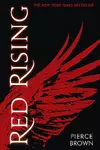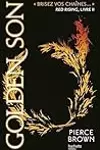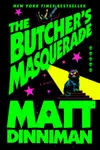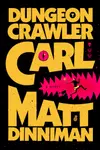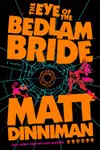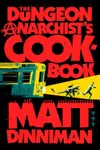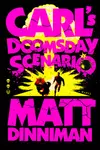Oliver Howard
🌕🌕🌕🌕🌗 I had tried reading this book a few times before, but I could never get past the first act. It felt generic, almost like a parody of other sci-fi/dystopian books. However, I stuck it out this time and found myself thoroughly enjoying it. Red Rising has the same easy-to-digest prose of a Sanderson book, but in a Sci-Fi setting. Darrow went from an annoying protagonist to one I was rooting for by the end. While the book has some fairly generic tropes, they are all done well and are extremely entertaining. Would recommend for anyone who wants an easy and entertaining read.
🌕🌕🌕🌕🌕 Going into this series, I had preconceived notions that it was not real literature or good writing. While it's not beautifully written, it has that X factor that just makes it so damn readable. This is a book I sat and stared at a wall for hours while listening to the audiobook. I had so much fun with it it's insane. It's definitely a derivative work, taking a lot of inspiration from other successful franchises like The Hunger Games, Percy Jackson, and A Song of Ice and Fire, but Pierce Brown just makes it work and stand on its own. I can't remember the last time I've been so eager to read the next book in a series -- it feels like a TV show I'm binging. It's not literary classic, but bloody damn it's entertaining.
🌕🌕🌕🌖🌑 Ultra-consumable, face-paced, and funny. Very crass at times, so I didn't always enjoy the humor, but the main characters were quite charming. I also felt the Lit-RPG aspects were well done -- it really felt like I was playing a video game or something. This would be something I'd continue if I wanted a quick pallete cleanser that I could read in a few days. I didn't think I'd want to keep reading this series, but the farther I get away from finishing it the more I want to dive back in. I did feel that I didn't care a whole lot about any of the side characters, or anyone aside from Carl and Donut for that matter, but I heard the storytelling gets better as the series goes on. ^c08aae
🌕🌕🌕🌖🌑 While I got frustrated with the excessive and loosely relevant historical anecdotes in this book, the underlying message and practices were well crafted. The technologies themselves are slightly dated by today’s standards (he kept talking about Facebook), the lessons and take aways can be applied to technologies today. If this book was about 50-75 pages shorted, my rating would be higher. This book is not anti-technology, instead it proposes an ideology I identify with which is that we should be selective about the digital tools we use, and be mindful about how we use them. I think this idea is ever important and will continue to be so for the foreseeable future.
🌕🌕🌕🌕🌑 For a YA book, this was pretty good. Themes were heavy handed (per usual with this genre), but I didn't feel like it took too much away from the reading experience. The main weak-point of the book was Lenore Dove. I just didn't like her and didn't believe Haymitch did much either (he liked to tell the reader he does though). Aside from that, I thought it was fun and recontextualizes Haymitch's character during the main series.
🌕🌕🌕🌕🌗 Dinniman continues to improve his character writing and emotional beats with each iteration. While I enjoyed the plot and setting a little bit less in this one compared to [[The Butcher's Masquerade]], everything else to continue to get better. Donut and Carl’s relationship deepens further in a satisfying way, and the “found family” aspect of the series really shines through in this book. I also love how the politics have expanded throughout the series, bringing some much needed intrigue to an otherwise pretty straightforward story.
🌕🌕🌕🌗🌑 I thought this was well written, well paced, and had a very interesting setting -- it just wasn't 100% for me. I didn't feel very connected to the main character, and I think that really made my reading experience lesser. It was short which was nice, but it just wasn't really my type of story.
🌕🌕🌗🌑🌑 While there were certainly some elements here that I really enjoyed, I also felt like there were a lot of problems. Firstly, the writing style for the first half of the book is all over the place. Alderman is jumping between characters and time periods so much and so fast that it gives you whiplash. She's attempting to be flowery at times, but it just feels out of place in an otherwise modern, snappy style. Another thing that bothered me was the way she revealed plot twists. It just wasn't interesting. I liked the technological aspects, and I think a lot of the stuff that was said here is important and relevant to current times. However, her ending felt rushed and frankly improbable. It took me out of the story because of how belligerently optimistic it was. This book has made me lose trust in Alderman, so I likely will not read any of her other work. ^08284f
🌕🌕🌕🌘🌑 Pretty short and consumable, but I just don't think older books are for me. I understand that Agatha Christie was one of the founders of mysteries as we know them, but I just derive more enjoyment out of more modern books. This makes sense because as time goes on, we create newer, tighter, and more exciting mysteries to unravel. I just have little to no desire to go back to the beginning to see what inspired these newer stories.
🌕🌕🌕🌖🌑 I think with any book of this length, you are bound to feel invested in the story and characters. And though I did, I was underwhelmed by *how* invested I was in the characters. All of the characters were likable enough, but I never felt super attached to any of them in particular. The reason I read this book was because of how highly people praised the story of friendship and all of the characters, but to me, that was not the strong suit of the book so I was a little disappointed in that regard. Also, what the hell was *that* scene? I knew it was in the book, but I thought there'd be at least some sort of justifiable reason for it. But no, King is just kind of weird. My last critique is there definitely was a lot of fluff in this book and could have been cut down. He spent too much time in the interludes and often went off on tangents that didn't have much to do with the plot. I like his descriptive style, but he seems to get distracted easily when writing. Now for the things I liked: The plot, the horror, and the structure. The plot was all I wanted out of this story. I felt the mystery, the fear, and while controversial, I actually really enjoyed the cosmic aspect at the end of the book. It was trippy and weird but also kind of fun. The one negative there was that It became too real and lost some of its mystery and therefore became less scary to me. Almost all of the horror scenes were actually pretty scary. The two stand outs were when Ben was walking home and first encountered It and the one with the refrigerator and the leaches. I also thought the use of the two time periods was really well done and added to the book. I haven't seen the movies, but I imagine they lose some of the emotional beats because they are linear. I thought it especially worked well at the end when they are fighting Pennywise in both time periods and you get to see the difference in their approaches.
As an end of a trilogy, this was mediocre at best. As an end of an arc, I think it was pretty decent. In my opinion, this one focused too much on action whereas the previous two only had a few big action set pieces. Because of that, this was my least favorite book in the series so far. I thought the characters remained good, but had a couple of weird choices. After 9 months of living in a box, why was Darrow the calm and collected one whereas Sevro was bloodthirsty and rash? I also really didn't like the end sequence because Darrow as the narrator literally lied to himself/audience to keep a plot twist secret. It definitely could have been done better where Brown doesn't break trust with his readers. It was still as readable as the previous two and I loved all of the Mustang scenes, but I definitely had some more issues with this book.
A solid follow-up to the first installment. The characters are just as complex and nuanced as ever, with some compelling development from almost the entire cast. Abercrombie effectively differentiates the characters at the start of this book from the characters at the end. It doesn't get 5 stars because the plot still feels a little hollow, serving as a bridge to the next book.
Tiago Forte's Building a Second Brain offers practical and actionable advice on how to create a digital system that supports your creative potential. His CODE framework for processing information keeps it simple and easy to follow along. The PARA organization system focuses not on a top-down, structured file system. Instead, it prioritizes actionability and relevance, leading to a more intuitive workflow. This organizational system worked for me, but I can see it being harder to apply for certain people. I personally found part three of this book not very helpful as it went from giving original and effective advice to more generic productivity advice that you have seen in countless other books and YouTube videos. I felt I could have skipped the section entirely and still come away with the same value from the book. Overall, if you are someone needing a digital reset, or are just curious about other digital management systems, this book is for you.
Ali Abdaal’s Feel-Good Productivity is a refreshing take on the personal productivity genre that prioritizes emotional well-being over hustle culture. Instead of the usual “grind harder” rhetoric, Abdaal introduces three core challenges to meaningful productivity—Energize, Unblock, and Sustain—and guides readers through each with a combination of scientific studies, philosophy, and lived experience.
In the best way possible, it is clear that Abdaal’s background is as a content creator: his writing is accessible, warm, and actionable without being self-congratulatory or preachy. The ideas feel grounded in both evidence and real life. While there are a few moments of repetition (the sections about motivation), they didn't feel too out of place and did not interfere with the flow of the narrative.
Some of the strongest sections explore the psychological underpinnings of productivity. The Energize section delves into how play, people, and power fuel motivation. The Unblock chapter breaks down how emotional blockers like fear, uncertainty, and trouble getting started can be overcome using practical tools like the 5-minute rule, cognitive reappraisal, and “the Batman effect.” In Sustain, Abdaal tackles conservation, recharging, and alignment in a way that feels empathetic, offering concepts like The Reitoff Principle, alignment experiments, and the Odyssey Plan as tools for reflection and recharge.
If you’re someone who finds traditional productivity advice overwhelming, rigid, or joyless, Feel-Good Productivity offers a human-first, flexible alternative.
Somehow Martin made a history textbook engaging and thought-provoking. The Targaryen dynasty is tragic to the point of unbelievability at times, but I guess that fits with the themes that Martin presents and works well within the world of Ice and Fire. The only reason this didn't get 5 stars was because of the inconsistent pacing at times. The Dance of the Dragons was by far the most interesting part of the book, but it left the aftermath feeling a little lackluster.
